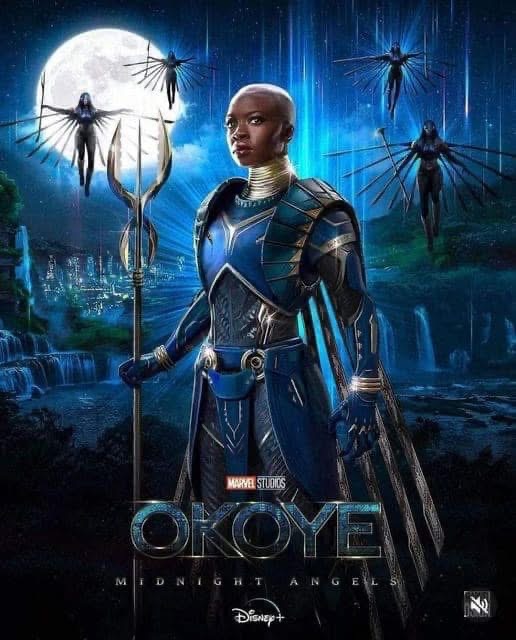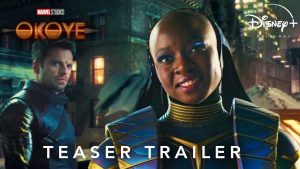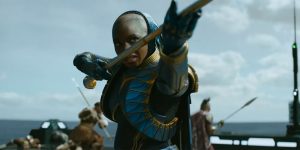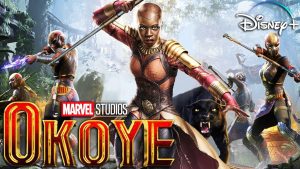OKOYE (2025)

Marvel Studios’ Okoye (2025) offers a thrilling and emotionally resonant journey into the life of one of Wakanda’s most formidable and respected warriors. Directed by Ryan Coogler, the film builds on the rich lore established in Black Panther and Wakanda Forever, while carving out a deeply personal and unique narrative for the titular character, played brilliantly by Danai Gurira.
Plot Overview
Set after the events of Black Panther: Wakanda Forever, Okoye explores the aftermath of Wakanda’s seismic political and cultural shifts. Okoye, having stepped away from her role as General of the Dora Milaje, now embraces the identity of a Midnight Angel. The film follows her as she grapples with the challenges of forging her own path outside the traditional structures of Wakandan society.
The central conflict arises when a covert group of international mercenaries infiltrates Wakanda’s borders, aiming to exploit its Vibranium resources. As Wakanda faces both internal divisions and external threats, Okoye is drawn back into the fray. Her mission isn’t just to protect her homeland but to uncover a conspiracy that ties back to her own past and the legacy of the Dora Milaje.
The narrative masterfully weaves action, political intrigue, and moments of introspection as Okoye struggles to reconcile her deep sense of duty with her desire for personal freedom. Flashbacks to her early life and training in the Dora Milaje offer poignant insights into her character, providing audiences with a richer understanding of what shaped her unyielding discipline and loyalty.
Performances
Danai Gurira delivers a career-defining performance as Okoye, showcasing an incredible range of emotions. Her portrayal of a warrior torn between tradition and self-discovery is both compelling and relatable. Gurira masterfully balances Okoye’s stoic strength with moments of vulnerability, making her journey deeply impactful.
The supporting cast brings additional layers to the story. Letitia Wright (Shuri) returns in a pivotal role, acting as both a confidant and foil to Okoye’s personal journey. Winston Duke’s M’Baku adds humor and gravitas, offering sage advice in his uniquely boisterous way. Michaela Coel reprises her role as Aneka, providing dynamic chemistry with Okoye, particularly during tense combat scenes and quieter, introspective moments.
A notable addition to the cast is [speculative actor], portraying a mysterious antagonist whose motivations challenge Okoye’s worldview. Their performance brings nuance and unpredictability to the film, elevating the stakes.
Action and Visuals
Okoye delivers some of the most stunning action sequences in the MCU to date. The film strikes a balance between grounded, visceral combat and the dazzling spectacle fans expect from Marvel. Highlights include a high-speed pursuit through the African savanna, an intense infiltration of a Vibranium mining facility, and a breathtaking showdown atop Wakanda’s iconic waterfalls.
The cinematography captures the beauty of Wakanda’s landscapes while emphasizing the intimacy of Okoye’s journey. Vibrant colors and intricate production design continue to reflect Wakanda’s fusion of tradition and advanced technology. The Midnight Angel suit, with its sleek design and enhanced capabilities, plays a central role in the action while symbolizing Okoye’s transformation.
Themes and Emotional Depth
At its core, Okoye is a story about identity, sacrifice, and the courage to forge one’s own path. The film delves into the tension between personal freedom and duty, a theme that resonates strongly with Okoye’s character. Her evolution from a loyal servant of Wakanda’s monarchy to an independent protector is deeply inspiring and relatable.
The film also explores the weight of leadership and the cost of maintaining peace in a world eager to exploit Wakanda’s resources. Themes of colonialism, unity, and resilience are woven seamlessly into the narrative, grounding the fantastical elements in real-world relevance.
Direction and Writing
Ryan Coogler’s direction shines once again, combining intimate character moments with grand, cinematic storytelling. The script, co-written by Coogler and [speculative writer], gives Okoye the space to grow and breathe as a character while maintaining the high stakes and fast pace of a superhero epic. The dialogue is sharp and emotionally charged, providing memorable exchanges between the characters.
Music and Sound Design
The score, composed by Ludwig Göransson, is another standout element, blending traditional African instruments with modern orchestral arrangements. The themes are haunting and triumphant, perfectly capturing Okoye’s journey. The sound design enhances the intensity of the action scenes, from the clash of Vibranium weapons to the quiet hum of the Midnight Angel suit.
Fan Service and World-Building
Marvel doesn’t shy away from rewarding long-time fans of the franchise. References to past films, subtle nods to Wakandan culture, and a mid-credits scene teasing the future of the Midnight Angels will leave audiences buzzing. At the same time, the film expands the world of Wakanda, introducing new locations, characters, and challenges that deepen the lore without overwhelming the story.
Conclusion
Okoye is a triumph for Marvel Studios, offering a deeply satisfying and emotionally rich narrative that celebrates one of Wakanda’s most iconic figures. It stands as a testament to the power of character-driven storytelling in the MCU, proving that even in a universe filled with gods and cosmic threats, the most compelling stories often come from the strength of the human (or Wakandan) spirit.
With its stunning visuals, electrifying action, and heartfelt performances, Okoye is a must-watch for both Marvel fans and newcomers alike. It’s a film that not only honors the legacy of Black Panther but also sets the stage for an exciting new chapter in Wakanda’s future.









